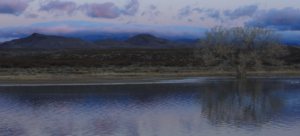
By New Mexico Wild Staff | May 25, 2023
On May 25, 2023, the U.S. Supreme Court issued a decision catapulting efforts to ensure clean water for communities back by fifty years. In Sackett v. EPA the Court considered where wetlands fit under the definition of the Waters of the United States (WOTUS), which are waters protected under the Clean Water Act. In its decision, the Court has sided with polluters by narrowing the definition of WOTUS and opening millions of acres of wetlands to pollution and degradation. Wetlands serve critical roles in ecosystems by helping to filter pollutants, controlling flooding and improving communities’ climate resiliency, and providing important habitat.
This ruling goes a step further than even the 2020 Dirty Water Rule by requiring wetlands to have a continuous surface connection to water bodies that are already included under WOTUS definitions. This means that wetlands that are separated from other water bodies by roads, berms, etc. are no longer protected under the Clean Water Act. The 2020 Dirty Water Rule radically re-interpreted the Clean Water Act, excluding from protection streams that flow only during wet times of year. Because so many of New Mexico’s waterways are ephemeral, this ruling disproportionately affected New Mexico and over 90% of our state’s waterways lost Clean Water Act protections. Although the Dirty Water Rule was replaced in late 2022 with a rule from the Biden administration that largely restored previous clean water protections, the decision in Sackett upends that and continues a pattern of undermining protection of New Mexico’s waterways.
Americans have time and time again recognized the need to protect our precious water resources, with a poll from 2022 showing that 75% of Americans support protecting more waters and wetlands and have a strong preference for the federal government, through the Environmental Protection Agency (EPA), to maintain water standards across the country.
New Mexico Wild’s Senior Water Policy Analyst, Tricia Snyder has issued the following statement in response to the decision.
“This decision undoes decades of efforts to ensure clean water protections across the country. By significantly reducing the scope of the Clean Water Act, it opens millions of acres of wetlands to pollution. New Mexico has been particularly affected by the back and forth in clean water protections and rather than clarifying, this decision serves to only confuse the matter further. New Mexico’s communities, culture, traditions, ecosystems, and economy all depend on access to clean water. It is critical that we now work at the state and local levels to protect our state’s waters to build climate resiliency and sustainable and equitable water systems that ensure access to clean, safe water for communities across New Mexico.”

